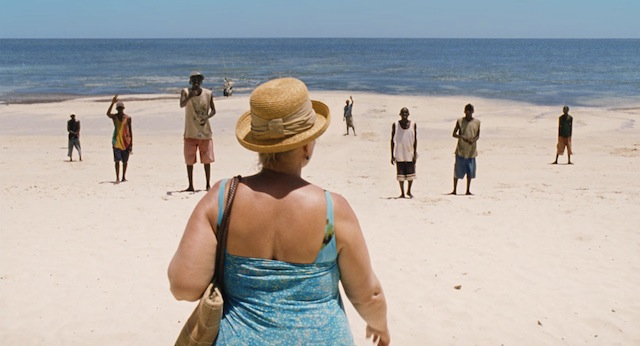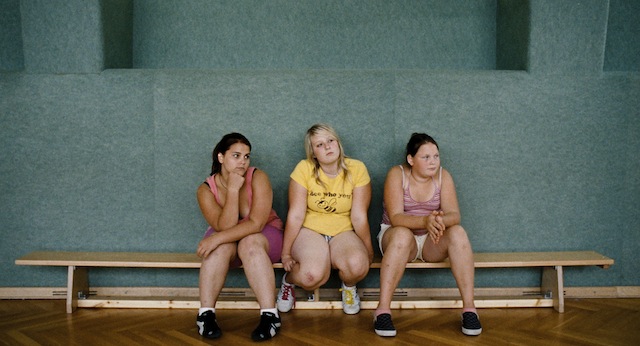CHICAGO – In anticipation of the scariest week of the year, HollywoodChicago.com launches its 2024 Movie Gifts series, which will suggest DVDs and collections for holiday giving.
Ulrich Seidl’s ‘Paradise’ Trilogy Proves Darkly Transfixing
 Rating: 4.5/5.0 |
CHICAGO – What is paradise but a mirage unaccustomed to reality? It hovers over us at all times, tantalizing our minds with illusions of perfection, divinity and eternal harmony. Only when one reaches out with desiring hands does it fade into the ether. No one seeks utopia without setting themselves up for certain disappointment.
Ulrich Seidl’s “Paradise” trilogy is a meditation on this theme in three movements. It presents us with three women each looking for their own impassioned conceptualization of paradise in all the wrong places. Watching them unfold is like bearing witness to a train wreck in slow-motion, but Seidl (the brilliant Austrian director of “Import/Export”) makes it impossible for us to tear our eyes away. This is a cautionary epic bristling with wicked humor and arresting intimacy. We get to know these women so well that our hearts ache for them even as we shake our heads in bewilderment.
Garnering the most attention (and screening slots in Chicago) is the trilogy’s first installment, “Paradise: Love,” starring Margarete Tiesel in what is truly one of the year’s most astonishingly fearless performances. She plays Teresa, a 50-year-old Austrian mother vacationing in Kenya who becomes seduced by the gorgeous local men selling their impeccably toned bodies for cash. In a series of hilariously frank conversations with her equally horny friends, Teresa exudes a deep-seated desire to be loved by a man who can see past her ample body fat and wrinkled skin. Though she resists the advances of aggressive would-be prostitutes, Teresa eventually caves in to Munga (Peter Kazunga), the one man with the patience to wait around for skittish clients. When he looks at her, Teresa feels as if he’s peering into her soul, but what he’s really looking for is her money. The game of mutual exploitation waged by this pair is morbidly fascinating to behold, as Teresa gradually allows herself to get lost in the dream before awakening to the ugly truth. Her patronizing objectification of locals is no less reprehensible than their calculated behavior designed to drain lonely schlubs of their dollars. There are no innocents in Seidl’s melancholic world, but there are no cardboard caricatures either, just misguided humans struggling to contrive joy in an effort to evade encroaching despair. Their chances of finding happiness are as good as that of a camper attempting to start a fire with rain-soaked logs.

Margarete Tiesel stars in Ulrich Seidl’s Paradise: Love.
Photo credit: Strand Releasing
Whereas “Paradise: Love” proves to be a rather boisterous audience movie, at least in its first half, the other two installments won’t elicit much audible reactions, apart from squirming discomfort. The middle chapter, “Paradise: Faith,” may be the most disturbing of all, as it follows Teresa’s sister, Anna Maria (Maria Hofstätter), as she attempts to evangelize neighbors with her fanatical brand of Catholicism. Few films have done as potent a job of portraying the pathology of religious extremists who substitute human connection with an eroticized spiritual life. Hofstätter’s performance is every bit as courageous as Tiesel’s, but in an entirely different way. Whereas Teresa impulsively dapples in debauchery, Anna Maria whips herself in front of her large bedroom crucifix as an act of penance for all carnal sins ever committed by mankind. She speaks to God with kindness and empathy, but treats her wheelchair-bound, Islamic husband, Nabil (Nabil Saleh), with indifference clouded by cruelty. Her self-imposed solitude and ever-increasing detachment from reality have caused her union with Jesus to be a one-way relationship as hollow and impersonal as Teresa’s dalliances with the Beach Boys. Though a few elements evoke the scathing amusement of “Love,” particularly Anna Maria’s mounting frustration in the face of a bumbling would-be convert, “Faith” is almost unbearably intense as the violence of its bruising climactic sequences threatens to erupt through the screen.
Last and arguably least is “Paradise: Hope,” which especially suffers in comparison to its predecessors. It’s the shortest film of the trilogy and also the least substantial, as it takes the viewer down an all-too-familiar Solondzian path before arriving at a similarly embittered conclusion. Yet the picture does benefit from its startlingly authentic depiction of budding teenagers grappling with their hormonal urges. The heroine this time is Teresa’s plump 13-year-old daughter, Melanie (a heartbreakingly sincere Melanie Lenz), who’s sentenced to spend the summer on a “fat farm” run by grim militaristic counselors. When Melanie discovers that her crush on a doctor (Joseph Lorenz) is indeed mutual, her interest quickly develops into an infatuation marked by daily “medical” check-ups. Though the love scenes between this unlikely pair (separated by four decades) are thankfully left offscreen, the ick factor is no less apparent. It’s clear that the doctor finds in Melanie his own form of unattainable paradise, and it’s not long before his rationality causes the fantasy to dissolve. The lesson Melanie will learn from this yarn is obvious from the get-go, which causes the tension to remain somewhat diminished throughout. As a standalone effort, this installment has the least amount going for it, but as a fitting finale to a fine trilogy, it does ultimately provide a glimmer of hope at the end of a very dark journey.

Verena Lehbauer, Melanie Lenz and Johanna Schmid star in Ulrich Seidl’s Paradise: Hope.
Photo credit: Strand Releasing
What is the best way for moviegoers to experience Seidl’s epic? At the Siskel Center, audiences will have only one chance to view the entire trilogy, thus requiring back-to-back screenings guaranteed to leave even devoted cinephiles wrung-out and spent. “Paradise: Love” is admittedly the most impressive of the three films, and should be experienced on the big screen, if only to admire the staggering deep-focus compositions of cinematographers Wolfgang Thaler and Ed Lachman (“Far from Heaven”). Taken all together, the “Paradise” films are not as bleak as they may sound on paper. The smile that quietly graces the face of Melanie in the final moments of “Hope” is so small that most viewers may miss it, but it’s indicative of her inner evolution. She has learned a valuable lesson in the hardest possible way, and can now live her life with newfound wisdom and purpose. One wishes her elders a similar fate in the aftermath of their own brutal epiphanies. These women may not be destined for paradise, but in the final fade-out of each picture, they are making their first crucial steps toward enlightenment.
 | By MATT FAGERHOLM |


